Advertisement
Review
Women Are Warriors In Actors' Shakespeare Project's Dystopian 'Julius Caesar'
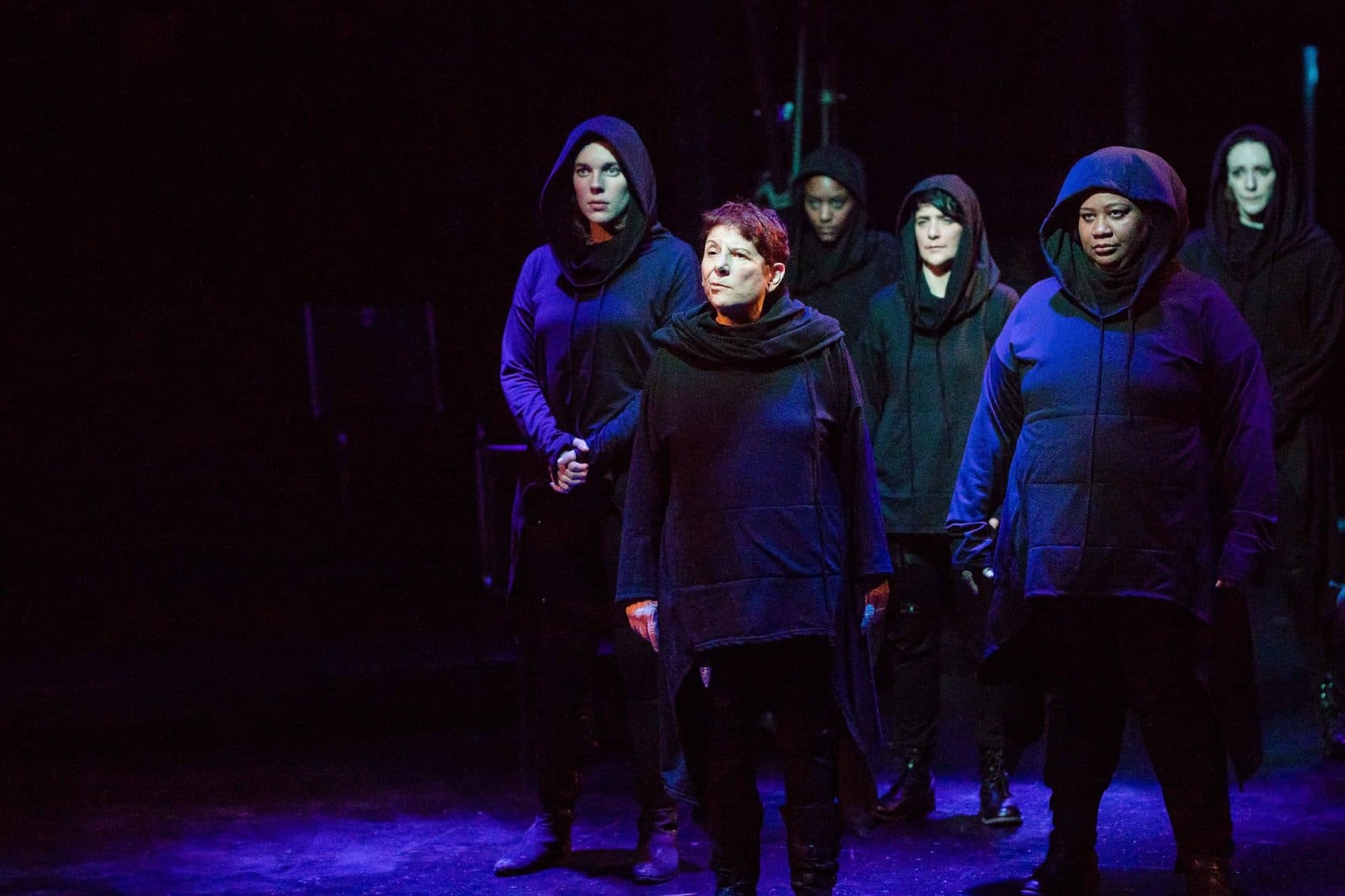
Actors’ Shakespeare Project offers a dystopian “Julius Caesar” that’s like something out of “Mad Max.” Whoops, make that “Mad Maxine,” since all of the play’s characters have been rethought as women.
The mostly male dramatis personae of Shakespeare’s tragedy built on political assassination are not just played by women. That would not be unusual, since most of the Bard’s meatiest roles were written for men, and women understandably want in on the act. And certainly in “Julius Caesar” the female characters, even Brutus’ valorous wife, Portia, are secondary, indeed sidelined by their sex.
But here, as director Bryn Boice explains in a program note: “Using Shakespeare’s play as our canvas and making this simple change, we have created science fiction, an alternative universe Rome.” The troupe has used the play, she says, “to speculate, exaggerate and explore what might happen if we, Womankind, came to power.” But since the painstakingly flogged gender switch changes little in the action of the play, it’s mostly a distraction from a “Julius Caesar” that is not without some serious chops.
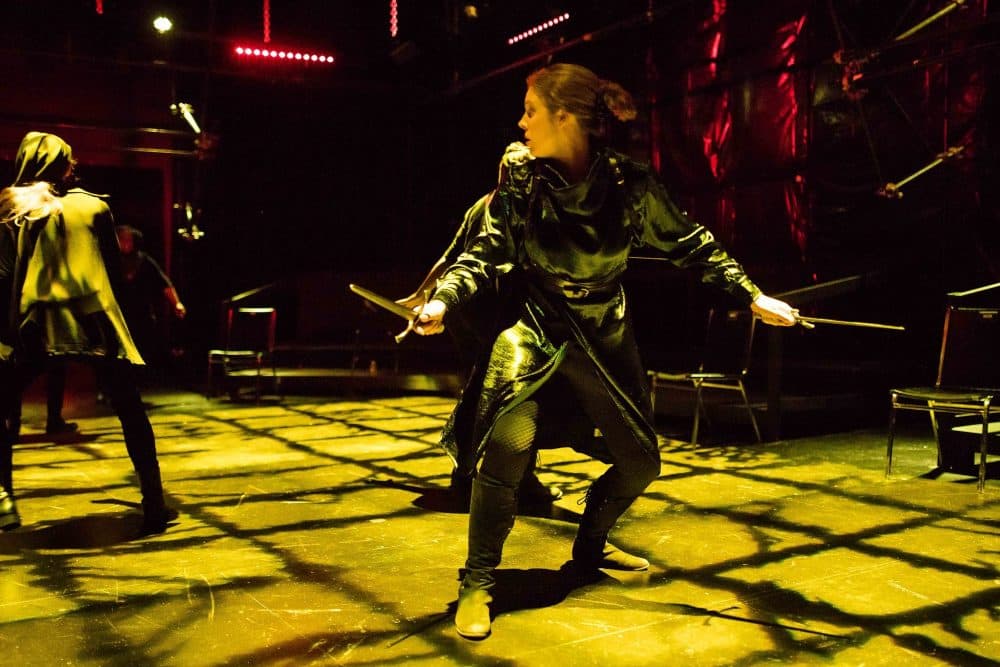
The production — which is set in the long, rectangular playing space of the Huntington Theatre’s Studio 210 (through Dec. 17), with the audience arrayed on two sides of the action — is both muscular and sinister, however ostensibly high-minded the assassination and civil war it depicts. There are only nine actors, who play multiple parts, including the hydra-headed role of the mob. But both governors and plebiscite being distaff does nothing to ameliorate the play’s descent from forcible regime change into political chaos — though I suppose it suggests that testosterone is not a prerequisite for savagery. And it does allow the electrifying Marianna Bassham a crack at the strongest, tenderest, most masterfully manipulative Marc Antony in memory.
As Boice also points out in her note, “Caesar” tends to pop up on our stages whenever there is a change of leadership. Last summer brought the controversial Public Theater staging in which Caesar was a bulbous Trump look-alike, sporting a long tie and blond wig: call him Orange Julius. Before that, in 2013, Minneapolis’ Guthrie Theater produced a coat-and-tie version of the play in which Caesar bore the imprint of Obama.
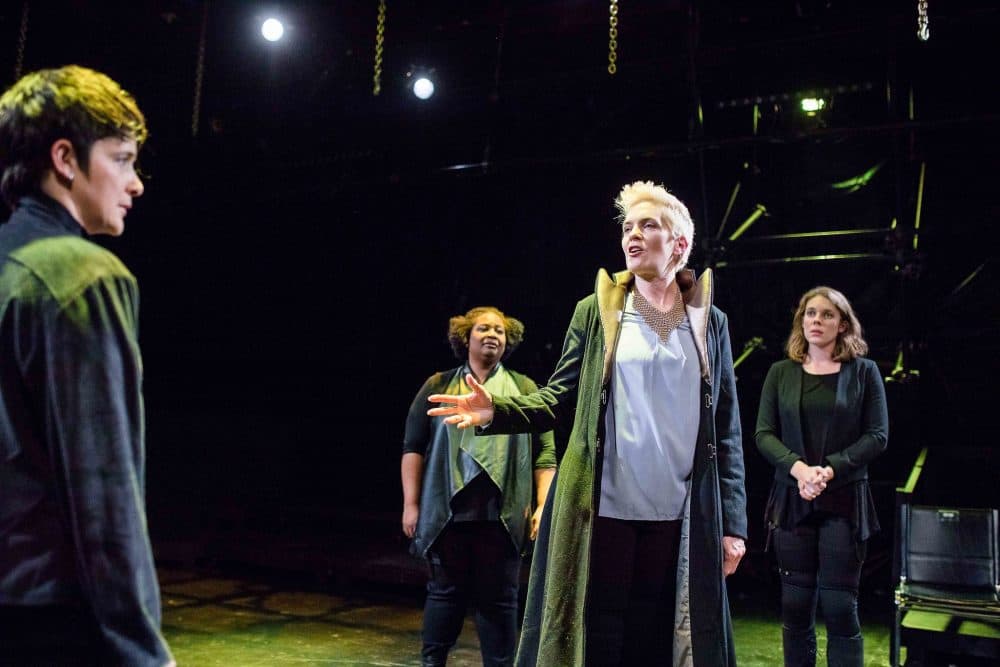
Here, however, we are thrust into a dark future — literally, as much of the action is played in shadow, the women clad in gender-neutral black cloaks, boots, leggings and hoods, with daggers strapped to their thighs. Caesar, in the platinum-haired person of Liz Adams, is like a burst of rock-star color amid the muck. But she suggests no contemporary politician, female or male, since the tragedy has been moved into a primitive, impending world wherein all the men have been erased. No one says where the species went, but clearly it had no monopoly on oratory, augury or grunting violence. (There are some changes to the text — for example, it is a co-conspirator rather than a servant who assists in Brutus’ suicide — but they don’t have much to do with gender.)
In Cristina Todesco’s simple, ominous set design, the play begins on a bare stage — above which dangles a trussed-up body hooked to a chain. Furthering the anxious atmosphere are Amy Altadonna’s percussive, stormy sound design and Jen Rock’s lighting, which runs the gamut from nearly nonexistent to red and flashing. As with the players in “Hamlet,” the performers begin with a violent dumb show that may foreshadow the murder of Caesar on the Senate floor and may hearken back to the offing of onetime triumvir Pompey the Great. Either way, it’s clear that this Rome, with its fickle populace soon to be riled up one way and then another, is a dangerous place to do business.
Advertisement
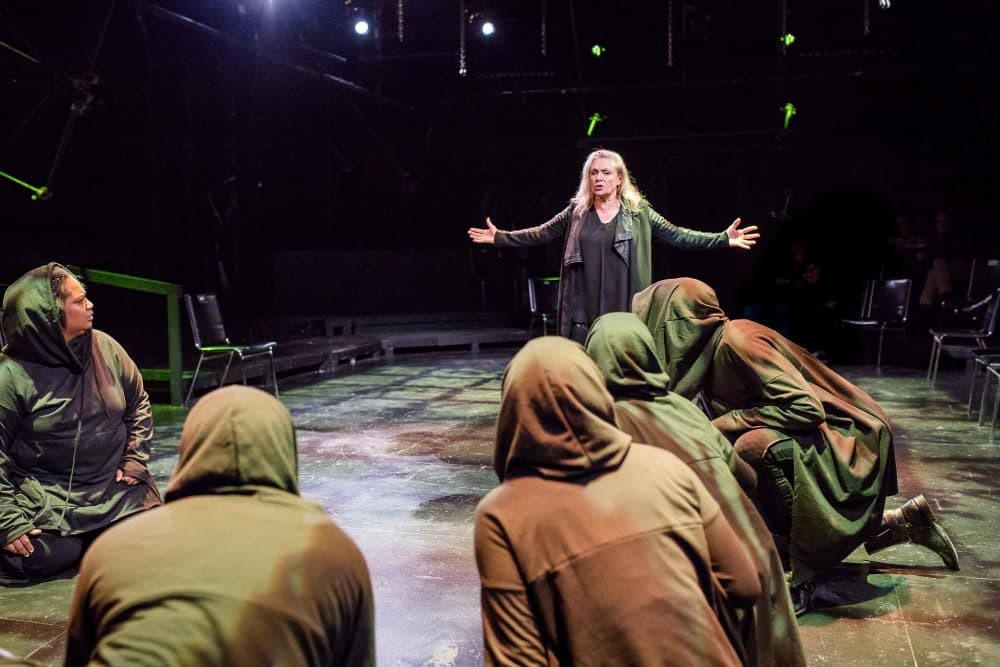
But if the rabble, apparently itching for a queen, are “sheep,” the play is more focused on their shepherds: the Roman senators, whether motivated by envy or idealism, who are out to save the republic by whatever means necessary. So the play centers not on Caesar or a citizenry that can be fanned like a flame, but on “the noble Brutus” and Cassius of the “lean and hungry look.” These two are portrayed by assured ASP vets Marya Lowry and Bobbie Steinbach, both tough and articulate, their differences as finely honed as their alliance.
As has often been pointed out, the tragic hero of “Julius Caesar” is not the title character but Brutus, who, among the conspirators, acts for what he believes to be the greater good of a Rome teetering toward dictatorship. Cassius, by contrast, is a bit of a weasel, using means both frank and crafty to win Brutus to the cause of killing Caesar. Suitably, Lowry’s Brutus is measured and authoritative, yet sincerely troubled and less savage than the rest of the posse. Steinbach’s Cassius is wary, smart, butch and barking. And, yes, both the characters’ friendship and their quarrel do seem tinged by them being female soldiers. But the play’s cautionary trajectory remains the same.
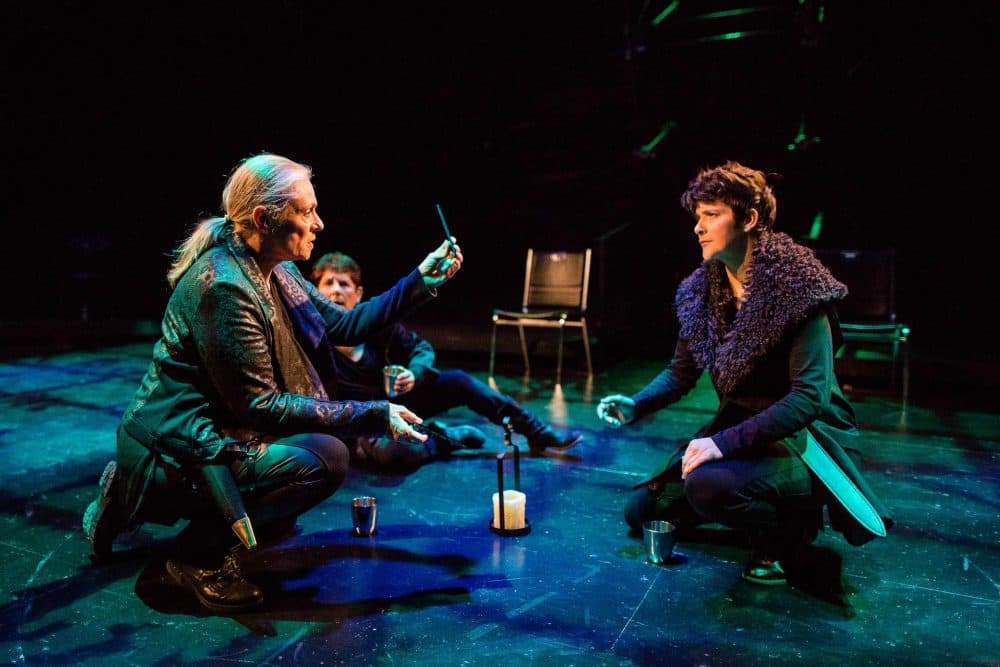
Though sometimes declamatory, the production — which also features Julee Antonellis, Erin Eva Butcher, MaConnia Chesser, Jade Guerra and Charlotte Kinder — is generally well spoken, the characters’ thought processes clear if occasionally belabored, the actors’ diction precise, the play’s oft-sanguinary imagery vivid. There did seem, on opening weekend, to be some rehearsal-room process, most of it having to do with the exploration of gender and militancy, still afoot, slowing the finished product down. Things will probably tighten as the run continues.
But even if they don’t, Bassham’s fiery, emotional turn as Antony makes the entire enterprise seem worth hatching. “Cry ‘Havoc!’ and let slip the dogs of war,” she booms through tears before dragging her mentor’s mangled corpse to the marketplace. And perhaps never has the “Friends, Romans, countrymen” oration been delivered with such scathing if self-effacing ire, such manipulatory purpose or such genuine anguish. Nor is Bassham less affecting when kneeling at the corpse of Brutus, adding her sword to the pile heaped at its feet. With this kind of feminine forcefulness poured into tights, who needs Wonder Woman?
“Julius Caesar” runs through Dec. 17 at Huntington Theatre’s Studio 210.
This segment aired on December 3, 2017.
